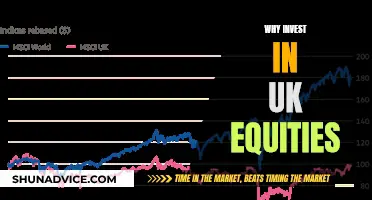
Investing is a great way to make your money work for you, but it always involves some level of risk. While there's always a possibility of adding revenue, there is also a very real chance of losing money along the way. Traditional investment options such as stocks, bonds, and mutual funds are popular for their potential returns, but they can be unpredictable. For example, the stock market is known for its volatile ups and downs. Additionally, investments can be complex and require a range of knowledge and experience to see returns. Furthermore, banks are generally not considered good brokerages, and their trading platforms can be slow and cumbersome. However, if you are not a day trader, Chase can be a solid option for self-managing your investments.
| Characteristics | Values |
|---|---|
| Returns | High returns possible but not guaranteed |
| Risk | Risk of losing value, including the principal amount invested |
| Liquidity | Some investments can be sold quickly, while others may take longer to convert to cash or withdraw |
| Complexity | Requires a range of knowledge and experience to see returns |
| Suitability | More suitable for long-term goals |
| Tax | Returns may be subject to tax withholding depending on various factors |
What You'll Learn

Investing with Chase vs. a separate brokerage
Chase offers a range of investment options, including brokerage accounts, which allow customers to buy and sell securities like stocks, ETFs, mutual funds, and bonds. With $0 commission online trades and access to market research, Chase provides an avenue for long-term wealth building. Additionally, Chase's J.P. Morgan Wealth Management offers personalized financial strategies and custom investment portfolios.
On the other hand, separate brokerages may offer more specialized services tailored to specific investor needs. These firms typically provide a broader array of investment options and tools, along with professional, licensed advisors who can guide clients through the complexities of investing. While some brokerages may charge fees for advisory services, they often have more advanced platforms and resources for active traders.
One key consideration is the trading platform's usability. Some users have described Chase's platform as slow and cumbersome, making it less ideal for day trading. In contrast, brokerages like Fidelity and TD-Ameritrade are praised for their efficient trading platforms, which facilitate quick and easy trades.
Another factor to consider is the level of financial advice provided. While Chase offers access to J.P. Morgan advisors, some users suggest that their bankers are unimpressive and lack knowledge. Separate brokerages may have more specialized advisors who can provide comprehensive financial analysis and guidance.
Furthermore, it is worth noting that banks and brokerages are distinct entities, and banks are not known for their brokerage services. Banks primarily serve as depositories, while brokerages focus on facilitating the buying and selling of securities. This distinction is important in the US financial system as it helps reduce concentration risk and conflicts of interest.
In conclusion, while Chase provides a range of investment options and access to J.P. Morgan advisors, separate brokerages may offer more specialized services, advanced trading platforms, and experienced advisors. The decision between investing with Chase or a separate brokerage ultimately depends on individual needs, investment goals, and preferences.
Equity Investment: Understanding Preferred Equity
You may want to see also

Chase's trading platform
Investing through Chase's trading platform comes with some risks. Firstly, it is important to note that investing, in general, involves a level of risk as there is always a possibility of losing money. While Chase's platform offers $0 commission online trades, it has been described as slow and cumbersome, making it unsuitable for day trading.
The Chase trading platform provides a range of investment options, including stocks, bonds, and mutual funds. It also offers access to market research and the expertise of J.P. Morgan specialists. One advantage of using Chase's platform is the ability to manage, move, and transfer funds between J.P. Morgan investment and Chase banking accounts seamlessly through the Chase Mobile® app or website.
However, some users have reported issues with the platform's functionality, particularly regarding the process of placing trades, which can be time-consuming and involve multiple steps. Additionally, there have been challenges with transferring funds between accounts, even with identical registrations.
It is worth noting that Chase is a bank, and while it offers brokerage services, some consider banks to be less effective brokers than dedicated brokerage firms. As such, if you are considering using Chase's trading platform, it is important to weigh the potential benefits against the risks and challenges described by users.
Selecting an Investment Manager: Key Considerations
You may want to see also

Chase's investment advice
Investing is a great way to make your money work for you, but it always involves some level of risk. While there's always the possibility of adding revenue, there is also a chance of losing money along the way.
Chase offers a range of services to support you as your financial needs evolve over time, whether you're new to investing or have years of experience. You can build your investment portfolio on your own with unlimited $0 commission online trades, or you can work with a J.P. Morgan advisor to receive tailored guidance and build a financial strategy based on your goals.
If you choose to invest on your own, you can open a J.P. Morgan Self-Directed Investing account (retirement or general) with qualifying new money by a certain date to get a cash bonus. You can also access market research and the collective expertise of Chase specialists, backed by the strength and security of a global investing leader.
If you choose to work with an advisor, you can connect with a J.P. Morgan advisor to receive tailored guidance and build a financial strategy based on your priorities and what's important to you. You can partner with experienced advisors and get ongoing guidance via phone, video, or in person at your local Chase branch or J.P. Morgan office.
Chase also offers a wealth planning service, where you can create a holistic strategy to help you meet your short- and long-term goals, from buying a home to estate planning and philanthropy. Their award-winning J.P. Morgan Wealth Plan® makes it easy to set and track your financial goals and offers personalized insights to guide you every step of the way.
Remember, investing always involves some level of risk, so it's important to consider your budget, financial goals, and risk tolerance when deciding how to invest your money.
Change Management: Invest in Your Business's Future Success
You may want to see also

Chase's fees
When it comes to fees, Chase offers $0 commission online trades for those who want to build their investment portfolio without the help of an advisor. However, if you choose to work 1:1 with a J.P. Morgan advisor, there will likely be fees involved for the tailored guidance and financial strategy provided.
While Chase does not charge fees for its investment services, there are potential fees to consider when investing in general. For example, if you open a margin account, which is a type of brokerage account that gives you a line of credit to buy stock, the lender may run a hard inquiry, temporarily decreasing your credit score. Additionally, about $2,000 is required to establish a margin account, and there is a risk of losing your investment and owing money, which could force you to sell shares at a loss.
It is also important to consider the potential fees associated with transferring funds between accounts. For example, one user reported having to call the help desk to transfer money between identical accounts and experiencing errors when trying to transfer online.
Overall, while Chase itself may not charge fees for its investment services, there are potential costs and risks associated with investing that should be carefully considered.
Comparing Investment Managers: Strategies for Smart Decisions
You may want to see also

Chase's customer service
Chase Bank is a digital bank owned by one of the largest US banking organisations, J.P. Morgan Chase. It offers a range of services, including current accounts, savings accounts, and investment solutions through its J.P. Morgan robo-advisory firm, Nutmeg.
Chase provides 24/7 customer service via phone and messaging services, with accessible support for those with hearing or speech difficulties. The bank has a solid rating of 4.2 stars out of 5 on Trustpilot, with 70% of customers awarding it 5 stars.
For those interested in investing, Chase offers a variety of resources to guide customers on their investment journey. The J.P. Morgan Wealth Management program provides tools, guides, and videos to help customers make the most of their accounts. The Wealth Plan tool, for instance, helps customers set and track financial goals and receive personalised insights. Additionally, Chase offers retirement and college planning guides, as well as articles and market insights to keep customers informed about the latest investment trends.
The J.P. Morgan Self-Directed Investing service allows customers to trade stocks, bonds, mutual funds, exchange-traded funds (ETFs), options, and fixed-income products online. This service is available to anyone over the age of 18 with a valid Social Security number and US address. There is no minimum account balance required to get started, and customers can take advantage of unlimited commission-free online stock, ETF, and options trades.
Chase also provides helpful tips and videos on its website, covering various investment-related topics. These include tutorials on using the Chase Mobile® App for investments, depositing checks, exploring investment ideas, buying stocks and ETFs using limit orders, designating beneficiaries, transferring assets, finding investments with screeners, and tracking portfolio performance.
Overall, Chase's customer service for investments provides a comprehensive range of resources and support to help customers navigate their investment options and make informed decisions.
Corporations' Investment Strategies: Debt and Equity Explained
You may want to see also
Frequently asked questions
Yes, investing is a risky business, and there is always a chance of losing money. Traditional investment options like stocks, bonds, and mutual funds fluctuate in value and may lose value.
Banks are generally not considered good brokerages, and their platforms can be slow and cumbersome. Chase is considered adequate for long-term investments but not for day trading.
It depends on your risk tolerance and financial goals. Investing with Chase may be right for you if you are looking for a safe option for long-term investments and are not interested in day trading.







